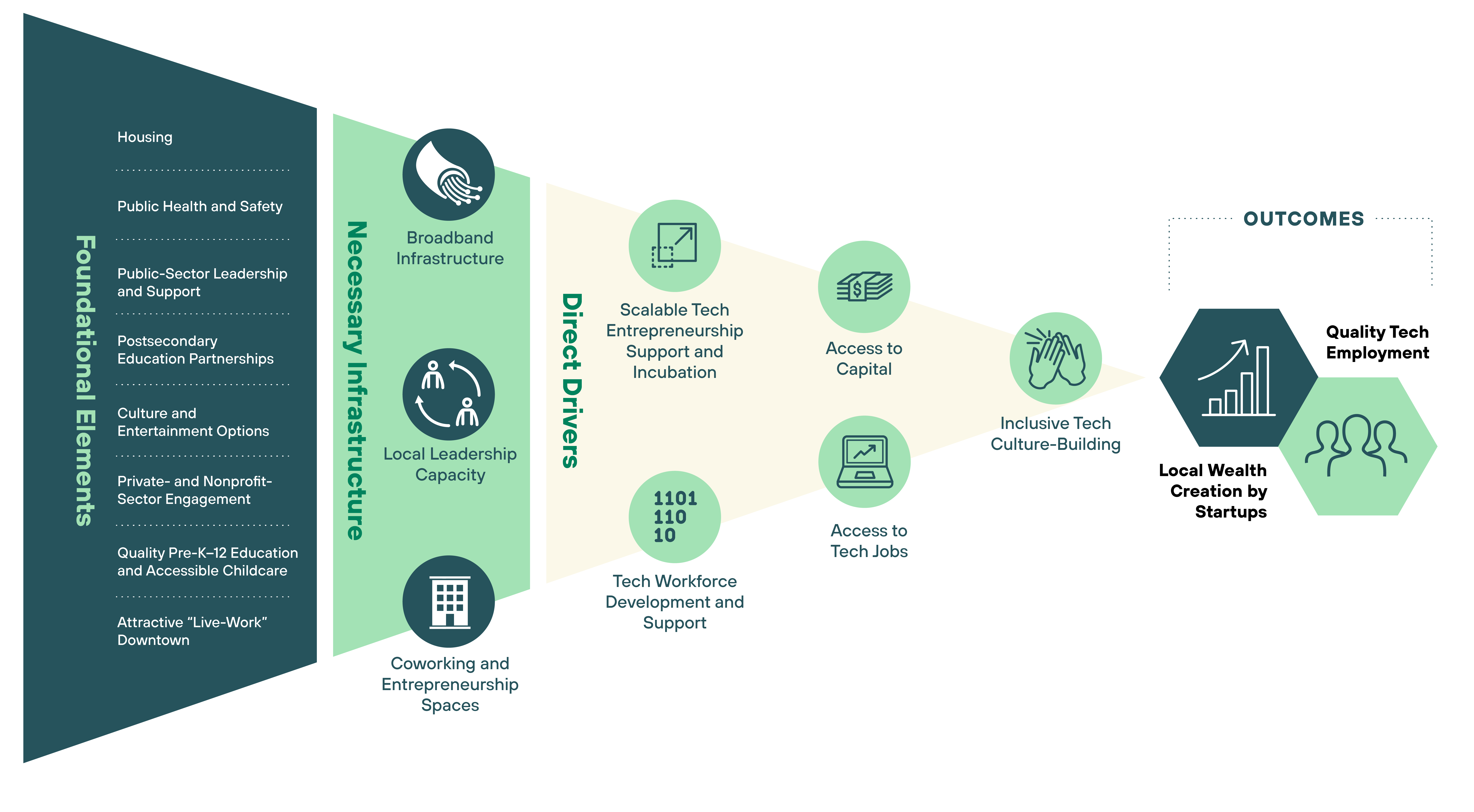Direct driver: Access to tech jobs
Communities need to be able to connect capable workers with opportunities in the technology industry. This requires them to have a sufficient mix of locally based tech employers and remote work opportunities.
What are direct drivers of a tech economy?
How does a rural place build a thriving tech economy ecosystem? At the Center on Rural Innovation, answering that question — and helping communities put those answers into practice — is a core part of our mission.
Based on our deep experience in rural economies, on-the-ground work providing technical assistance on tech-based economic development with rural communities across the country, and intensive data analysis, we have identified five direct drivers of rural tech economy ecosystems — the elements that enable communities to successfully compete in the tech economy: scalable tech entrepreneur support and incubation; tech workforce development and support; access to capital; inclusive tech culture building; and access to tech jobs. As part of our work, we help rural communities — who each come to the table with different assets and strengths — develop strategies for implementing each of these drivers.
In this five-part blog series, we dive into each direct driver — defining it, explaining its purpose, highlighting rural communities in our Rural Innovation Network that exemplify doing it well, and offering tips on how other communities can drive their own success.
Direct driver No. 4: Access to tech jobs
At the Center on Rural Innovation, we define access to tech Jobs as a direct driver like this:
Communities need to be able to connect capable workers with opportunities in the technology industry. This requires them to have a sufficient mix of locally based digital employers and remote work opportunities, plus mechanisms (e.g., online job board, career coaching) to connect job seekers with job opportunities.
Access means opportunity
By definition, a rural tech ecosystem can only succeed when there is abundant tech work that locals have a real opportunity to participate in. Right now, this is not true in too many rural communities because of the concentration of technology jobs in major metros since the Great Recession. Still, there are real paths to reversing this trend, focused primarily on two avenues: increasing local employment and increasing remote employment.
Locally, many rural communities already have tech opportunities — local economic development leaders just need to find them. That’s because many anchor rural employers — such as hospitals, banks, and schools — do have a need for tech talent, but often outsource it. Working to bring those jobs home can create immediate opportunity that helps both the local workforce and important local institutions.
Rural communities can also use the rise in remote work to their advantage, capitalizing on the fact that employers have realized tech jobs can be done from anywhere.
Whether through policy incentives or outreach and networking, rural communities can pitch their places as havens for remote work, either through individuals working remotely or satellite offices. And having a high number of remote tech employees has other spillovers for the ecosystem, by workers bringing knowledge, expertise, and connections from a wide variety of tech employers.
On both paths, for rural communities to really foster access to tech jobs, they need to conceptualize economic development as building for the future economy, not just for the existing one.
While it might be easier to take a short term view and focus on filling open opportunities in non-tech sectors, the long-term path to tech economy success rests on proactively creating and expanding access to tech jobs.
Success stories from the Rural Innovation Network
- Pikeville, Kentucky: One way to spur tech employment is through a project shop, where workers are contracted to do tech projects for other entities. Bit Source in Pikeville is an excellent example. Bit Source taps into the high-tech, high-touch skills of the local workforce to do web and app development, social media marketing, and cutting edge VR technology, all driven by their vision of directing locals’ skills towards a new paradigm of locally-created digital products and solutions.
- Traverse City, Michigan: The technology incubator 20Fathoms knows that tech companies focused on growth need to know where the right kind of talent is. So, 20Fathoms provides dedicated talent acquisition support, helping local companies identify top candidates. They even have a dedicated Head of Talent Acquisition who also focuses on connecting local talent with the opportunities for them to thrive.
Strategy tips
- Engage local employers to identify tech needs. Many rural communities do not have a full picture of how many tech jobs could be present locally if institutions hired locally instead of outsourcing. By talking with the employers that are currently outsourcing tech, community leaders can create better pipelines between locals and job opportunities.
- Make your community friendly to remote work. This can come in the form of policy, such as incentives either for companies to hire remotely in certain places or for workers to relocate to certain places. One example is Colorado’s Location Neutral Employment Incentive. Another strategy is to build out coworking spaces, which can be attractive to remote workers while increasing the density of local tech talent, increasing opportunities for knowledge spillover.
Conclusion
The other elements of a tech ecosystem can only go so far unless residents have a real opportunity to hold technology jobs while living in the community. These jobs form the foundation of the tech economy and are integral in building and sustaining the workforce that will build tomorrow’s tech startups and innovations.
Keep reading
Interested in learning about our other direct drivers? You can read about each of them here:
- Direct driver: Access to capital
- Direct driver: Inclusive tech culture building
- Direct driver: Digital workforce development
- Direct driver: Scalable entrepreneur support and incubation
To meet the Rural Innovation Network communities doing ecosystem building in small towns across the country, you can find a list here.
If you are a community interested in working with us to grow or build your own digital economy ecosystem, please contact us.

